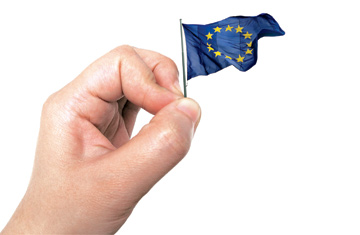
Correction Appended: March 9, 2010
It was supposed to be the moment Europe grew muscles. Last fall, after a decade of work to simplify policymaking and make the European Union more efficient at home and stronger abroad, the last few holdouts signed a 1,000-page document known as the Lisbon Treaty. In November, the E.U.'s first real President and Foreign Minister were chosen. Europhiles dusted off their familiar dream: of a newly emboldened world power stepping up to calm trouble spots, using aid and persuasion where it could, but prepared to send in troops when it had to. Brussels would lead the fight against climate change. And Europe's economies would prove to the ruthless free markets of North America and Asia that the social market still offers the best way out of an economic crunch.
The dream didn't last a month. At the climate change conference in Copenhagen in December, it was China and the U.S. who haggled over a final deal, while Europe sat on the sidelines. Instead of a foreign policy triumph, 2010 began with an unseemly squabble over whether or not to bail out Greece, whose debt has dragged down Europe's currency. At the same time, U.S. President Barack Obama announced he would be skipping an E.U.-U.S. confab in Spain in May, frustrated, it appeared, with the endless summitry that goes with accommodating the E.U. Little wonder that Europe finds itself in one of its periodic bouts of angst-ridden self-doubt. And little wonder that the rest of the world is asking questions: What does Europe stand for? Where does it fit into a world that seems set to be dominated by China and the U.S.? Would anyone notice if it disappeared?
Let's get one thing straight: Europe is a remarkably good place to live. Many of the E.U.'s member states are among the richest in the world. Workers in Europe usually enjoy long vacations, generous maternity leave and comfortable pension schemes. Universal health insurance is seen as part of the basic social contract. Europe is politically stable, the most generous donor of development aid in the world. Sure, taxes can be high, but most Europeans seem happy to pay more to the state in return for a higher — and guaranteed — quality of life. "The E.U. offers an attractive social, economic and political model," Charles Grant, director of the London-based think tank Centre for European Reform, argued last year. "It is more stable, safe, green and culturally diverse than most parts of the world, which is why neighbors want to join and many migrants aim for Europe."
But the good life at home doesn't make Europe strong abroad. The E.U. may have all the soft-power credentials in the world, but on the grand stage it has lacked the weight and influence of others. At times, it simply seems unable to say what it thinks. Washington and Beijing may squabble from time to time, but the U.S. has a reasonably well-articulated China policy: engage economically, encourage democratically, and criticize on human rights when appropriate. What's the E.U.'s China policy in a few words?
The E.U. underwhelms on other big issues. "When it comes to pressing international problems like Afghanistan, Pakistan or North Korea, the E.U. is either largely invisible or absent," wrote Grant in his essay, provocatively titled "Is Europe Doomed to Fail as a Power?" Lucio Caracciolo, editor of Limes, one of Italy's leading foreign policy magazines, says the problem is a Cold War hangover. The post-World War II period was a golden age for Western Europe, a time of reconstruction under the U.S. security umbrella, he argues. When it ended, Europe went into shock. "We're in denial," Caracciolo says. "We see that the Americans are not interested — to put it mildly — in our interests, and we put our head in the sand." Europe "happily decides," Caracciolo says, that Afghanistan, Iran, are American affairs. "Any major crisis is something that is analyzed abroad. We are not up to the responsibilities of the time."
The Lisbon Treaty, establishing the new offices of the President of the European Council and the High Representative for Foreign Affairs and Security Policy, was supposed to change all that. In practice, however, the new E.U. will be run by a complex mechanism with four axes: the President and Foreign Minister; the country holding the rotating presidency; the President of the European Commission and national heads of state and government. The new setup looks like a parody of all that is wrong with the E.U., bureaucratic and complicated, built on least-bad options and seemingly designed to encourage turf wars rather than action.
